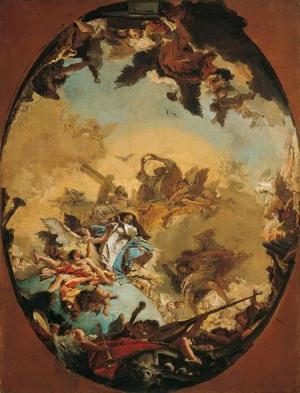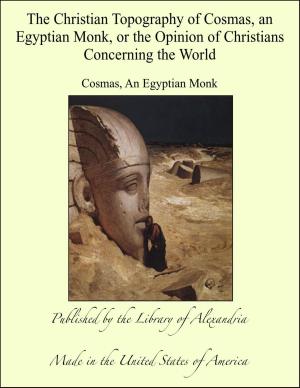The History of Christianity: Consisting of the Life and Teachings of Jesus of Nazareth
Nonfiction, Religion & Spirituality, New Age, History, Fiction & Literature| Author: | John Stevens Cabot Abbott | ISBN: | 9781465627155 |
| Publisher: | Library of Alexandria | Publication: | March 8, 2015 |
| Imprint: | Language: | English |
| Author: | John Stevens Cabot Abbott |
| ISBN: | 9781465627155 |
| Publisher: | Library of Alexandria |
| Publication: | March 8, 2015 |
| Imprint: | |
| Language: | English |
No one now takes much interest in the history of the world before the coming of Christ. The old dynasties of Babylon, Media, Assyria, are but dim spectres lost in the remoteness of the long-forgotten past. Though the Christian lingers with solemn pleasure over the faintly-revealed scenes of patriarchal life, still he feels but little personal interest in the gorgeous empires which rise and disappear before him in those remote times, in spectral vision, like the genii of an Arabian tale. Thebes, Palmyra, Nineveh,—palatial mansions once lined their streets, and pride and opulence thronged their dwellings: but their ruins have faded away, their rocky sepulchres are swept clean by the winds of centuries; and none but a few antiquarians now care to know of their prosperity or adversity, of their pristine grandeur or their present decay. All this is changed since the coming of Christ. Eighteen centuries ago a babe was born in the stable of an inn, in the Roman province of Judæa. The life of that babe has stamped a new impress upon the history of the world. When the child Jesus was born, all the then known nations of the earth were in subjection to one government,—that of Rome. The Atlantic Ocean was an unexplored sea, whose depths no mariner ever ventured to penetrate. The Indies had but a shadowy and almost fabulous existence. Rumor said, that over the wild, unexplored wastes of interior Asia, fierce tribes wandered, sweeping to and fro, like demons of darkness; and marvellous stories were told of their monstrous aspect and fiendlike ferocity. The Mediterranean Sea, then the largest body of water really known upon the globe, was but a Roman lake. It was the central portion of the Roman Empire. Around its shores were clustered the thronged provinces and the majestic cities which gave Rome celebrity above all previous dynasties, and which invested the empire of the Cæsars with fame that no modern kingdom, empire, or republic, has been able to eclipse. A few years before the birth of Christ, Julius Cæsar perished in the senate-chamber at Rome, pierced by the daggers of Brutus and other assassins. At the great victory of Pharsalia, Cæsar had struck down his only rival Pompey, and had concentrated the power of the world in his single hand. His nephew Octavius, the second Cæsar, surnamed Augustus, or the August, was, at the time Jesus was born, the monarch of the world. Notwithstanding a few nominal restraints, he was an absolute sovereign, without any constitutional checks. It is not too much to say, that his power was unlimited. He could do what he pleased with the property, the liberty, and the lives of every man, woman, and child of more than three hundred millions composing the Roman Empire. Such power no mortal had ever swayed before. Such power no mortal will ever sway again. Fortunately for humanity, Octavius Cæsar was, in the main, a good man. He merited the epithet ofAugust. Though many of the vices of paganism soiled his character, still, in accordance with the dim light of those dark days, he endeavored to wield his immense power in promotion of the welfare of his people. Little did this Roman emperor imagine, as he sat enthroned in his gorgeous palace upon the Capitoline Hill, that a babe slumbering in a manger at Bethlehem, an obscure hamlet in the remote province of Syria, and whose infant wailings perhaps blended with the bleating of the goat or the lowing of the kine, was to establish an empire, before which all the power of the Cæsars was to dwindle into insignificance. But so it was. Jesus, the babe of Bethlehem, has become, beyond all others, whether philosophers, warriors, or kings, the most conspicuous being who ever trod this globe. Before the name of Jesus of Nazareth all others fade away. Uneducated, he has introduced principles which have overthrown the proudest systems of ancient philosophy.
No one now takes much interest in the history of the world before the coming of Christ. The old dynasties of Babylon, Media, Assyria, are but dim spectres lost in the remoteness of the long-forgotten past. Though the Christian lingers with solemn pleasure over the faintly-revealed scenes of patriarchal life, still he feels but little personal interest in the gorgeous empires which rise and disappear before him in those remote times, in spectral vision, like the genii of an Arabian tale. Thebes, Palmyra, Nineveh,—palatial mansions once lined their streets, and pride and opulence thronged their dwellings: but their ruins have faded away, their rocky sepulchres are swept clean by the winds of centuries; and none but a few antiquarians now care to know of their prosperity or adversity, of their pristine grandeur or their present decay. All this is changed since the coming of Christ. Eighteen centuries ago a babe was born in the stable of an inn, in the Roman province of Judæa. The life of that babe has stamped a new impress upon the history of the world. When the child Jesus was born, all the then known nations of the earth were in subjection to one government,—that of Rome. The Atlantic Ocean was an unexplored sea, whose depths no mariner ever ventured to penetrate. The Indies had but a shadowy and almost fabulous existence. Rumor said, that over the wild, unexplored wastes of interior Asia, fierce tribes wandered, sweeping to and fro, like demons of darkness; and marvellous stories were told of their monstrous aspect and fiendlike ferocity. The Mediterranean Sea, then the largest body of water really known upon the globe, was but a Roman lake. It was the central portion of the Roman Empire. Around its shores were clustered the thronged provinces and the majestic cities which gave Rome celebrity above all previous dynasties, and which invested the empire of the Cæsars with fame that no modern kingdom, empire, or republic, has been able to eclipse. A few years before the birth of Christ, Julius Cæsar perished in the senate-chamber at Rome, pierced by the daggers of Brutus and other assassins. At the great victory of Pharsalia, Cæsar had struck down his only rival Pompey, and had concentrated the power of the world in his single hand. His nephew Octavius, the second Cæsar, surnamed Augustus, or the August, was, at the time Jesus was born, the monarch of the world. Notwithstanding a few nominal restraints, he was an absolute sovereign, without any constitutional checks. It is not too much to say, that his power was unlimited. He could do what he pleased with the property, the liberty, and the lives of every man, woman, and child of more than three hundred millions composing the Roman Empire. Such power no mortal had ever swayed before. Such power no mortal will ever sway again. Fortunately for humanity, Octavius Cæsar was, in the main, a good man. He merited the epithet ofAugust. Though many of the vices of paganism soiled his character, still, in accordance with the dim light of those dark days, he endeavored to wield his immense power in promotion of the welfare of his people. Little did this Roman emperor imagine, as he sat enthroned in his gorgeous palace upon the Capitoline Hill, that a babe slumbering in a manger at Bethlehem, an obscure hamlet in the remote province of Syria, and whose infant wailings perhaps blended with the bleating of the goat or the lowing of the kine, was to establish an empire, before which all the power of the Cæsars was to dwindle into insignificance. But so it was. Jesus, the babe of Bethlehem, has become, beyond all others, whether philosophers, warriors, or kings, the most conspicuous being who ever trod this globe. Before the name of Jesus of Nazareth all others fade away. Uneducated, he has introduced principles which have overthrown the proudest systems of ancient philosophy.















